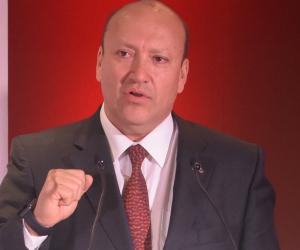Q&A: Fecoljuegos president Evert Montero Cardenas

The Colombian gaming association's president highlights the importance of relationships between operators and banks to growing the country's regulated igaming market.
The lack of regulation in Latin America has been one of the biggest barriers to entry for igaming operators, especially those from other regions. Access to financial institutions and payment methods has been another.
As the first Latin American country to regulate igaming, Colombia was the first test of whether or not the removal of the first barrier would lead to advances in terms of the second.
Indeed, one of the aims of local industry association Fecoljuegos was to improve the relationships between online operators and the banking sector. This has been particularly important given it requires operators have an account with an authorised and regulated financial entity to make sure they have the necessary resources to pay their players.
Fecoljuegos president Evert Montero Cardenas talks to iGaming Business about how things have developed as the Colombian market has expanded.
iGaming Business: How has operators’ and suppliers’ access to banking facilities changed since the market regulated in 2016?
Evert Montero Cardenas (EM): Although there have been some developments, and a lot of work has been done to build relationships with the banking sector, we still have not achieved the access we hoped for. We have noticed that there is a greater interest in understanding our industry and what we do in terms of compliance and transparency. Thanks to the work we have done to make our compliance efforts more visible, the financial sector now listens to us and participates in discussions, which in turn, allows them to get to know the sector and gain feedback on some of the practices they have implemented.
We must recognise the great support that BBVA has offered us. It is one of the few financial entities that has taken the opportunity to work with us, and has become an important ally in this task.
With regards to the operation of online gaming, the good news is that thanks to the myth-busting work we have been doing with the financial sector, banks are now looking at the possibility of facilitating direct payments for online operators.
iGB: What role do you play as an industry representative in terms of educating financial institutions about gambling companies?
EM: Fecoljuegos has been working on a reputation strategy since 2018. As part of this, we have organised different spaces for meetings, presentations and feedback sessions with Asobancaria [Colombia’s banking association], the directors of various banks, the financial superintendent, government entities and working groups of compliance officers from different economic sectors in the country.
The participation of all these groups in our discussion groups has been key to gathering a set of recommendations and requests from the banking sector, which have decreased the access difficulties for the gaming industry, and have given them the chance to understand the efforts the financial sector is making to improve their practices and prevent the kinds of risks that have affected gaming’s inclusion in the financial system.
In addition to organising forums, working groups, meetings and presentations about the industry, Fecoljuegos also attends national and international events, such as the FIBA AML Compliance Conference, and anti-money laundering and terrorism financing events organised by the financial and gaming sectors. These spaces encourage the professionalisation of gaming in terms of risk prevention and compliance, which should inspire more trust in the operational processes of these companies.
iGB: What steps do you think need to be taken to improve the ability of operators to access banking facilities and by whom?
EM: Although we have achieved a considerable advancement in the relationship between the gaming and financial sectors, there is still a long way to go in order to achieve the inclusion we want. We will have to work with banks, the financial regulator and government bodies to gain access to the services and products that operators need. We will continue to insist on inclusion and that we do not want privileges or exceptions; we just want operators to have the same compliance demands made of them as would be made of any other business.
iGB: Colombia has a low level of financial inclusion, with World Bank statistics stating just 45% of Colombian adults have bank accounts (although this is an improvement from previous years). How does this hinder the success of online operators?
EM: According to the financial inclusion index published by the Bank of Opportunities in Colombia, 81.3% of adults have at least one financial product. This bankability allows online operators to strengthen their businesses and facilitates digital sales. The more people that have access to the financial sector, the more opportunity there is to get a wider range of online players, rather than at physical terminals.
However, it must be remembered that although a significant percentage of the Colombian population is banked, there are still difficulties and barriers to inclusion for the gaming industry, given that banks still have not authorised direct use of their platforms for payments.
iGB: What payment methods are popular in Colombia given so many people don’t have bank accounts?
EM: Colombian regulation offers two types of commercialisation for online gaming: retail and internet, the latter uses payment providers or goes directly through the banking sector. However, because of the difficulties the gaming industry has had with the financial sector, the payment system that has gained most traction in the country is retail, through physical terminals.
Evert Montero Cardenas will be speaking at a panel entitled ‘Banks to the left of me, players to the right, here I am: Stuck in the Middle’ at Juegos Miami. This year’s Juegos Miami event, exploring opportunities in Latin American and Caribbean gaming, will be held from May 29 to May 31. See the full agenda here.
